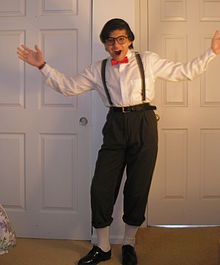Nerd
A nerd is a person seen as overly intellectual, obsessive, introverted or lacking social skills. Such a person may spend inordinate amounts of time on unpopular, little known, or non-mainstream activities, which are generally either highly technical, abstract, or relating to topics of science fiction or fantasy, to the exclusion of more mainstream activities.[1][2][3] Additionally, many so-called nerds are described as being shy, quirky, pedantic, and unattractive.[4]
Originally derogatory, the term "nerd" was a stereotype, but as with other pejoratives, it has been reclaimed and redefined by some as a term of pride and group identity. However, the augmentative terms, geek and dork, have not experienced a similar positive drift in meaning and usage.[5]
Etymology
The first documented appearance of the word nerd is as the name of a creature in Dr. Seuss's book If I Ran the Zoo (1950), in which the narrator Gerald McGrew claims that he would collect "a Nerkle, a Nerd, and a Seersucker too" for his imaginary zoo.[3][6][7] The slang meaning of the term dates to 1951.[8] That year, Newsweek magazine reported on its popular use as a synonym for drip or square in Detroit, Michigan.[9] By the early 1960s, usage of the term had spread throughout the United States, and even as far as Scotland.[10][11] At some point, the word took on connotations of bookishness and social ineptitude.[6]
An alternate spelling,[12] as nurd or gnurd, also began to appear in the mid-1960s, or early 1970s.[13] Author Philip K. Dick claimed to have coined the "nurd" spelling in 1973, but its first recorded use appeared in a 1965 student publication at Rensselaer Polytechnic Institute (RPI).[14][15] Oral tradition there holds that the word is derived from knurd (drunk spelled backwards), which was used to describe people who studied rather than partied. The term gnurd (spelled with the "g") was in use at the Massachusetts Institute of Technology (MIT) by the year 1965.[16] The term "nurd" was also in use at the Massachusetts Institute of Technology as early as 1971.[17]
According to Online Etymology Dictionary, the word is an alteration of the 1940s term "nert" (meaning "stupid or crazy person"), which is in itself an alteration of "nut" (nutcase).[8]
The term was popularized in the 1970s by its heavy use in the sitcom Happy Days.[18]
Culture
Stereotype
Because of the nerd stereotype, many smart people are often thought of as nerdy. This belief can be harmful, as it can cause high-school students to "switch off their lights" out of fear of being branded as a nerd,[19] and cause otherwise appealing people to be considered nerdy simply for their intellect. It was once thought that intellectuals were nerdy because they were envied. However, Paul Graham stated in his essay, "Why Nerds are Unpopular", that intellect is neutral, meaning that you are neither loved nor despised for it. He also states that it is only the correlation that makes smart teens automatically seem nerdy, and that a nerd is someone that is not socially adept enough. Additionally, he says that the reason why many smart kids are unpopular is that they "don't have time for the activities required for popularity."[20]

Stereotypical nerd appearance, often lampooned in caricatures, can include very large glasses, braces, buck teeth, severe acne and pants worn high at the waist. Following suit of popular use in emoticons, Unicode released in 2015 its "Nerd Face" character, featuring some of those stereotypes: